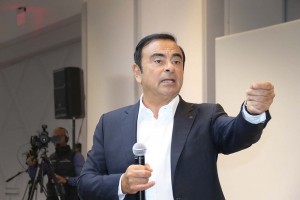In something of a surprise move, Nissan is shifting senior marketing executive Fred Diaz to Mitsubishi where he will become the troubled Japanese automaker’s U.S. chief executive.
The announcement comes at a time when the bigger Japanese automaker is consolidating its control of Mitsubishi, in which it took a controlling stake in 2016 following a series of scandals that nearly pushed Mitsubishi into bankruptcy.
“With his in-depth background and experience in North America, Fred has a strong ability to proactively engage with Mitsubishi Motors’ dealers and customers as we aim to expand our dealership network, enhance our brand and drive sales growth,” Mitsubishi’s U.S. COO Trevor Mann said in a statement.
The 52-year-old Diaz has been considered a rising star at Nissan, which he joined in 2013 as its U.S. sales and marketing vice president. He has more recently been serving as head of light truck and commercial sales, marketing and operations across North America.
(Update: Ghosn successor plan wins approval. Click Here for the details.)

Renault-Nissan-Mitsubishi Alliance chief Carlos Ghosn continues his makeover of Mitsubishi with the Diaz appointment.
Prior to joining Mitsubishi, Diaz had been a long-time employee at Chrysler and Fiat Chrysler Automobiles, post-bankruptcy. His duties included both heading the Ram brand and serving as CEO of Chrysler de Mexico and Latin America.
Born in Texas with family roots in Mexico, Diaz earned a bachelor’s degree from Texas Lutheran University before starting out as a trainee with the old Chrysler Corp. in its Dallas sales zone. He subsequently moved north and later got his MBA at Central Michigan University.
Diaz’s career has put a heavy emphasis on light trucks operations. One of the most challenging projects was splitting off the pickup-oriented Ram brand from Dodge, which shifted focus primarily to performance vehicles.
At Nissan he has helped revitalize the automaker’s pickup program, most recently launching two versions of the full-size Titan including a first-ever medium-duty model.
Diaz will continue to be heavily involved in trucks in his new post, Mitsubishi shifting away from its traditional focus on sedans, coupes and sports cars to crossover-utility vehicles. Perhaps his most immediate challenge will be the ongoing launch of the Eclipse Cross. The sporty CUV brings back one of the Mitsubishi brand’s most famous models, albeit transforming Eclipse into a crossover vehicle this time.
Diaz will serve as both president and CEO of Mitsubishi’s North American operations April 1, succeeding Ryujiro Kobashi, who returns to Japan.
(Click Here for more about Renault-Nissan-Mitsubishi taking the global sales lead.)
The Mitsubishi brand had a long-running affiliation with Chrysler – which marketed a number of models, such as the Arrow, through its various U.S. brands. The relationship began to short-circuit as the DaimlerChrysler “merger of equals” collapsed and the U.S. carmaker that emerged fell into bankruptcy.
Mitsubishi, meanwhile, had a series of its own crises, including one triggered by revelations it concealed potentially deadly safety defects. In the U.S., a series of marketing blunders, including a campaign aimed at winning over young buyers with ultra-cheap loans, failed and helped drive the company’s parent into financial collapse, Mitsubishi surviving only with the help of a bailout by a consortium of Japanese banks.
In 2015, the automaker abandoned its U.S. plant, in large part due to declining sales. The next year, it acknowledged rigging mileage tests on products sold in Japan, triggering another financial disaster that threatened to put it into bankruptcy. Nissan – which had long sold some Mitsubishi products under its own brand – stepped in and took a controlling stake in the struggling carmaker.
Carlos Ghosn, who has held an assortment of C-suite jobs in the Renault-Nissan Alliance, last year relinquished his post as CEO of Nissan to take on the chief executive role at Mitsubishi Motors Corp.
A turnaround is expected to take a number of years, according to industry analysts, but it has already paid off in at least one form. By combining Mitsubishi sales in with those of Nissan and Renault, the Franco-Japanese alliance reported total global sales of 10.61 million in 2017, narrowly beating out Volkswagen to become the world’s best-selling auto group. Rival Toyota came in third.
(Nissan‘s XMotion Concept signals its new design direction. Click Here to check it out.)
In the U.S., meanwhile, Mitsubishi has slowly begun clawing its way back. Sales rose 7.7% in 2017, its fifth consecutive annual increase. But while sales again topped 100,000 last year it still has a long way to go to match its previous U.S. sales record of 345,111 set in 2002.

